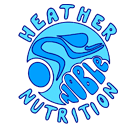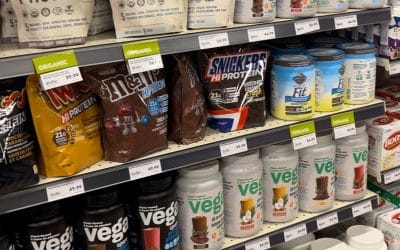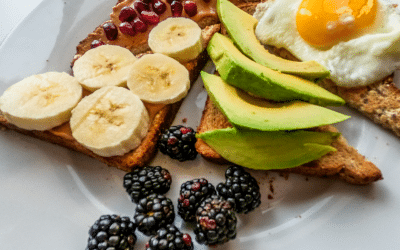I think we can all agree- literally ‘running’ to the bathroom in the middle of a race is beyond frustrating, uncomfortable and performance-hindering.
Many people struggle with GI issues ranging from diarrhea, gas, acid reflux, nausea and cramping during exercise- and sometimes for prolonged periods afterwards. This is especially common in long-distance runners.

The exact reason why this happens remains a mystery, but what we do know is that food moves more quickly through the GI tract of an athlete during exercise, especially running. Here are some factors that likely contribute to digestive distress:
- The physical bouncing of organs and increased intra-abdominal pressure
- Blood flow is redirected from the GI tract to the active tissues during exercise (muscle, heart, lungs and brain)
- Hormone secretion (to help with digestion) in the GI tract is altered
- The introduction of a new food or a lot of food at once
- Anxiety and stress before the race or workout
The good news is, there are many steps you can take to help lower your chances of having GI issues during exercise or a race.
Here are 8 tips that you can implement during training and racing to help reduce the risk of GI discomfort.
- Avoid foods high in fat and fiber before exercise.
- Avoid foods that are high in fat and fiber 3-4 hours to digest before exercise. These foods take a long time to move through your GI tract and be absorbed. Depending on the individual, you may need to restrict your fiber intake for even longer leading up to exercise. Although these foods are essential for good health and should be included in our every day diet, they will likely lead to discomfort if they are trying to be digested while we are running laps around a track.
- What foods to avoid: vegetables, whole grains, beans and lentils, fruits with skin on, dried fruit, avocado, nuts/seeds, all processed fast food (french fries) etc.
- Choose fewer gas-producing foods before exercise.
- These foods are carbohydrates that ferment in the large intestine. They include foods high in fructose, lactose, insoluble fiber and starch.
- Examples: beans, lentils, asparagus, broccoli, brussels sprouts, cabbage, artichokes, onions, pears, soft drinks, dairy products, oat bran, peas, corn, pasta, potatoes, artificial sweeteners, whole grains, brown rice and oatmeal.
- Depending on the individual, many of these foods may be perfectly tolerated in smaller amounts pre-race.
- Have a high-carb, easily digestible snack 60 minutes before exercise.
- There is no need to eat a lot before your workout or race. Remember that it is the food you have eaten in the last 48 hours that will primarily fuel your next training session. Have a small snack high in simple carbohydrates 60 minutes before.
- Ideas for pre-race snacks: banana, jam or honey on white bread, smoothie, graham crackers with nut/peanut butter, applesauce, etc.
- Avoid carbonated drinks and artificial sweeteners before and during exercise.
- Carbonated drinks and sodas can cause gas, heartburn, bloating, cramping and other fun stuff.
- Many and large amounts of artificial sweeteners (sucralose, aspartame, saccharin etc.), many of which contain sugar alcohols, can cause gas, bloating and diarrhea.
- Avoid known irritant foods before and during exercise, especially on an empty stomach.
- Listen to your body and keep a food journal of what you eat leading up to training in order to help identify trigger foods.
- Some common irritant foods are dairy (milk, cream, cheese, yogurt), caffeine, alcohol, meat, beans/legumes, high-fiber vegetables.
- Limit hyperosmolar fluids before and during exercise.
- These are fluids that have a high concentration of sugar. This can lead to incomplete absorption and residual carbohydrates in your GI tract, which can cause GI distress during exercise.
- Many sports drinks are actually designed to be an optimal concentration of water and sugar so that the simple carbohydrates are better tolerated and absorbed in the GI tract.
- Research suggests that consuming a carb drink during exercise with multiple types of carbohydrates (glucose + fructose) leads to increases in absorption and fluid delivery because glucose and fructose are absorbed by different transporters.
- Ideas for carb beverages during exercise (only recommended if exercise is >60 mins duration): Gatorade, Powerade, INFINIT Jet Fuel, or homemade sports drink (with diluted juice and added salt).
- Stay well hydrated before, during and after exercise.
- Choose foods higher in sodium leading up to a long-distance event (especially in hot conditions). This will help you to stay hydrated for longer and retain more water. Hydration is extremely important for overall performance as well as preventing GI distress.
- Make sure you take frequent small sips of water or sports drinks instead of large amounts of liquid all at once.
- Always practice your race nutrition well before the big day.
- Plan and practice with your pre-/during-race nutrition well ahead of race day! There is a lot of evidence that the GI tract is highly adaptable and can actually be trained to increase the absorption of certain nutrients, including carbohydrates.
- If you are training for long-distance event, make sure you check ahead of time what foods and brands of nutrition products will be provided to athletes on race day (Gatorade, Cliff gels, bananas etc.). It is recommended that you train using these products months before leading up to the event or to bring your own race nutrition.
A few reminders before you go:
- Everyone’s digestive systems are different. A lot of the time it comes down to trial and error what works best for your body.
- If you are trying a new food or nutrition product, try it on a less important workout.
Written by: Heather Noble, RD




